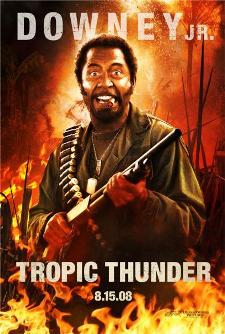Assessing The Themes Of Tropic Thunder
[THIS ARTICLE CONTAINS SIGNIFICANT SPOILERS FOR TROPIC THUNDER. YOU'VE BEEN WARNED]
One of my favorite films this summer is Ben Stiller's Tropic Thunder. While it didn't do as well at the box office as I might've hoped, I think the film is hilarious and pitch-perfect in the way it ridicules Hollywood excess. Furthermore, this movie is the Hot Fuzz of Hollywood war films; where the former was a parody of the best action films ever made, Tropic Thunder takes elements of war films and turns them on their head, from the grizzled veteran, to the skinny and green straight man, all the way to the brutal and revered enemy leader (in this case potrayed by the simultaneously adorable and terrifying Brandon Soo Hoo).
But underneath its sheen of light-hearted hilarity lies a biting message not just about the lengths to which actors will go for an Oscar, but about the ridiculousness of white cultural appropriation.

Prior to the film's release, there were rumblings of controversy with Robert Downey Jr.'s portrayal of a white Kirk Lazarus who had skin pigmentation surgery so that he could portray black war general Sgt. Osiris in the movie-within-a-movie. Downey Jr.'s role brought to mind memories and images of the practice of blackface minstrel shows, in which white males painted their faces black with grease paint and enacted outrageous and exaggerated black stereotypes for the purposes of entertainment. In other words, it recalled a time when people were more ignorant and showed less civility and regard for fellow human beings based upon factors under which they had no control.
When cultural elements are appropriated and converted into stereotypes to get a laugh, to sell tickets, or to sell a product, it has the potential to be demeaning and offensive to the subordinate group. It can perpetuate negative stereotypes and cheapen those things that are otherwise revered and respected. Nonetheless, white cultural appropriation continues to be evident in both obviously crass and insidiously subtle ways, from the baffling slogan for McDonald's all the way to the team insignia of certain baseball teams.
How, then, would Downey Jr. be able to play a character whose mere visage was so racially charged?
Let me emphasize that I cannot speak on behalf of any demographic group that might be offended by Downey Jr.'s performance, but for me, his role is made palatable due to two factors: 1) His considerable skill as an actor, which allows him to walk the razor-thin tightrope between hilarity and offensiveness, and 2) The presence of Brandon T. Jackson's African-American character, Alpa Chino. Chino's character, which can be prominently seen in the film's trailers, show him consistently trying to take Downey Jr. down a racial peg whenever possible, bringing him back down to earth and pointing out exactly how moronic his method acting has become. In other words, he renders Downey Jr.'s potentially offensive portrayal as a black man into something that you laugh "at," and not "with." Thus, the movie seeks not to duplicate the grotesque blackfaced performances of yesteryear, but rather to make them objects of ridicule.
Furthermore, while not acknowledging a specific act of appropriation, Tropic Thunder's portrayal of Asians also recalls the simplistic and crude manner in which Asians are typically deployed in these types of films. Whereas previous war films have depicted Asians as an evil "other," using them merely as nameless and heartless foils to American characters, this film exaggerates those portrayals to the point of absurdity. Like the Kirk Lazarus character, at first glance the film appears to be even more offensive than the Hollywood tropes of Asians it is lampooning but in truth ends up mocking the ways in which white culture appropriates foreign cultural elements for its own ends.
Yet the movie is not afraid to demonstrate that subtle cultural appropriation continues to this day. To paraphrase Asian comedian Russell Peters (who I don't necessarily always agree with), white culture's contribution to dance can be encapsulated completely by the existence of the Funky Chicken and the YMCA. It's perhaps appropriate, then, that in the last scene of the film, Tom Cruise dances in hilarious fashion to Ludacris' "Get Back." While this scene goes on for maybe 30 seconds too long, I think it totally works in the context of the film because it is clear example of a white male (who once terrified Will Smith in Fresh Prince because, according to Smith, they had found a way to make him "even whiter" in Interview with a Vampire) trying to conform to an element of black culture (hip hop) and looking completely stupid and ridiculous while doing so.
Tropic Thunder subverts the spectre of white cultural appropriation that hovers over not only this film, but of many others that Hollywood has already released. It takes appropriations that should be offensive and makes them objects of ridicule. It is as subversive as it is funny, as offensive as it is thought-provoking. For all this it deserves both our applause and laughter. It is one of the best films of this summer. Go see it.Update: Devin Faraci from Chud has responded to this article here and Jen Yamato from Rottentomatoes has responded here.Hear us review Tropic Thunder live on the /Filmcast with Jake and Amir from Collegehumor, tonight at 10 PM EST / 7 PM PST. Click here to go to Slashfilm's live page.
